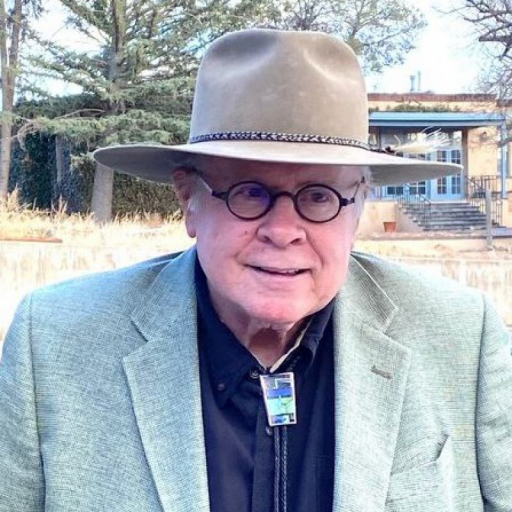

Robert Taber
April 5, 1943 — January 5, 2024
Robert (Bob) Laux Taber, whose hard-charging life took him from the world of scientific academia to the commercial world, the journey replete with Nobel laureates, highly classified governmental work, and numerous biotech start-ups, died on January 5, 2024 at his home in Santa Fe, New Mexico. He was 80 years old.
Bob Taber’s life was an interesting one in so many ways. Born on April 5, 1943, Bob was a member of the Mayflower Society and a descendent of the earliest settlers in America - many of whom were whalers who settled on Martha’s Vineyard and around New Bedford, Massachusetts in the 1630s. He was very proud of the fact that his great grandfather, Jacob Taber, joined the Union Army in 1862 at the age of 16 and fought through the war, in a regiment that tragically lost 300 of its 400 enlistees. His great grandfather was present at Appomattox. Bob would also point out that creativity, inventiveness, and adventure were built into his gene pool as between his father, his uncle and his grandfather there were at least a dozen patents before he was born.
Bob graduated from Harpur College (SUNY) in 1964 and then earned a PhD with a focus on molecular biology from the University of Pittsburgh School of Medicine in 1969. He then accepted an American Cancer Center Postdoctoral Fellowship at MIT, working with Professor David Baltimore from 1969-71, During that time, Professor Baltimore was awarded the Nobel Prize for his work and Bob would remember with glee that he had a lab bench right next to Dr. Baltimore as these important discoveries on tumor viruses and their interaction with the genetic material of the cell were taking place.
In the 1970’s, Bob became a founding member of a new Medical School, the University of Massachusetts Medical School. The first class of 16 students entered in 1970, and Bob taught microbiology there between 1971 – 1973. Today this Medical School consistently ranks among the best in the country.
From 1973- 1978, Bob moved on to Roswell Park Memorial Institute in Buffalo as a cancer research scientist. At the time Roswell Park was one of the three National Cancer Institutes for Nixon’s “War on Cancer.” The others were Sloan Kettering and MD Anderson. Bob conducted research as a virologist and left as Chair of Viral Oncology in 1978 to move west.
In 1978, Bob was hired as Deputy Director for Basic Science at the Northern California Cancer Program, based at Stanford University. He also taught Cancer Chemotherapy at UCSF, where he had a lab, during that time. In 1981, interested in moving beyond academia, Bob became one of the founding members of a new company, Integrated Genetics, which was to become one of the first biotech companies to be founded in the US and went on to have two public offerings. Having experienced the excitement of using his biomedical background to launch commercial ventures, Bob Taber took on yet another interesting professional turn in 1985 to become President and CEO of a division of EG&G that focused on biomedical testing. Taber ran multiple high-profile projects for EG&G during this time, most notably one at Kirkland Air Force Base that involved 400 volunteers and ended up resetting the US Army’s blast overpressure standards for combat. His division at EG&G also was one of three entities that helped determine what was actually carcinogenic for the National Cancer Institute and supported biotech testing for startups such as Biogen, Amgen, and Genentech.
But by the early 1990s, as Bob would tell it, he was ready to make another move and this one would take him south to Durham, North Carolina, and Duke University Medical Center. He accepted an offer from then-Chancellor Dr. Ralph Synderman to head the fledgling office of science and technology. He worked at Duke as a Vice Chancellor for Corporate and Venture Development until he retired in 2014 to Santa Fe. During his time at Duke he negotiated thousands of deals on behalf of the institution and the faculty and raised many hundreds of millions of dollars to support the academic enterprise. One of his proudest achievements was initiating and negotiating the deal that would become the Duke-National University of Singapore Medical School. He doggedly pursued this project despite considerable skepticism early on among many about its viability and, working with top leadership at Duke and a handful of high-ranking Singaporean officials, made it happen in 2005. The Singaporean government has invested more than one US$ billion in the school and it is now seen as one of the very best Medical Schools in Asia.
Bob will be missed by friends and loved ones for his wit, intellect, unfailing curiosity in learning, and his incredible breadth of knowledge, honed by reading 2 -3 books at a time for 365 days a year. At the time of his death, his literary range was apparent from three books stacked on his reading table: The Moral Case for Fossil Fuels by Alex Epstein, Angle of Repose by Wallace Stegner, and The Preparatory Manual of Explosives, 4th edition, by Jared Ledgard.
Things came easily to Bob: athletics (he made the All-Star Little League team in Binghamton, New York, when he was 11), jobs (he never had to look for a job, not even as a graduate student or post-doc), and friends (his virtual rolodex included hundreds of people from all over the world, all of whom he remembered by name). And it was perhaps this lucky ease with everything he did that made him larger than life is so many ways. Good bye, Bob Taber. Some of us can still hear your distinctive, infectious laughter, so full of energy and charm, ringing through the halls of the Davison Building at Duke.
Guestbook
Visits: 24
This site is protected by reCAPTCHA and the
Google Privacy Policy and Terms of Service apply.
Service map data © OpenStreetMap contributors



